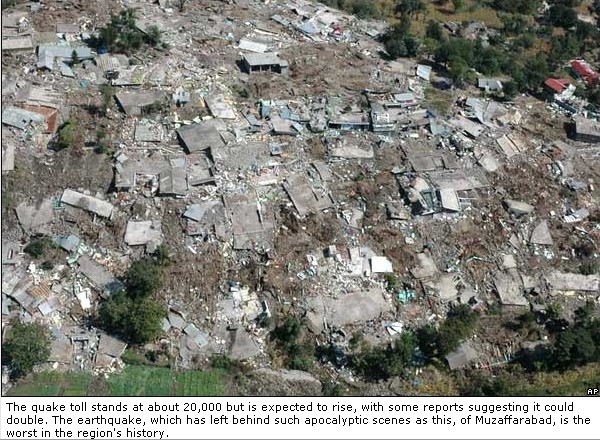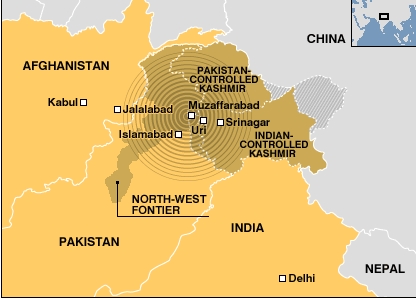
A 7.6 magnitude earthquake struck close to Muzaffarabad in Pakistan-administered Kashmir on Saturday 8th October 2005 morning causing widespread devastation. Although the tremor was felt as far afield as Kabul and Delhi, the main areas affected have been Pakistan administered Kashmir and the North-West Frontier Province of Pakistan.
Pakistan says more than 18,000 have been killed by Saturday's powerful earthquake that also hit northern India and Afghanistan. The 7.6-magnitude quake, with an epicentre 80km (50 miles) north-east of Islamabad, flattened entire villages. Another 40,000 people are believed to be injured, said military spokesman Major-General Shaukat Sultan.

Several countries have offered to help, with US President Bush and UN chief Kofi Annan expressing their concern. "The people of the United States offer our deepest sympathies for the loss of life and destruction," said George W Bush in a statement. Mr Annan said he was "deeply saddened by the loss of life" and announced that the UN was sending a team to co-ordinate relief efforts. UK Foreign Secretary Jack Straw said the government was sending $177,000, along with 60 medical staff, emergency workers and foreign office staff. The US has promised $100,000. India, a long-time rival with Pakistan for control over Kashmir, has also offered to help with rescue operations.
Pakistani President Pervez Musharraf has described the quake as a "test of the nation". Maj-Gen Sultan told the BBC that the government's priorities were to evacuate those in need of medical care, establish medical treatment centres on the ground, and provide shelter for thousands of homeless people. He said clearing debris on the roads was also of prime importance, as landslides and rain were hampering relief efforts.
The earthquake, which hit at 0350GMT on Saturday, was felt as far away as the Afghan capital, Kabul, and India's capital, Delhi. Several aftershocks followed some having magnitude 6. It is thought to be the strongest earthquake to hit the region in a century.
In one incident, around 250 children were said to have died when two schools collapsed in the North-West Frontier Province's Mansehra district. About 200 soldiers are also thought to have been killed by landslides and falling debris. I could only do one thing which was to pick people out of the rubble and with my bare hands I started to dig said Karam Umrani.
In Mansehra, shop owner Haji Fazal Ilahi lost his wife, two daughters and his brother when their house collapsed. "I could see rocks and homes tumbling down the mountains," said Mr Ilahi, who was driving home to his village when the earthquake struck. "When I reached my village, there was nothing left of my home," he told the Associated Press news agency.
The earthquake's epicentre was close to Muzaffarabad, the capital of Pakistani-administered Kashmir. Rescue teams have reportedly been airlifted into the city.

Prime Minister Shaukat Aziz said almost 50% of all homes in the area had been destroyed. Landslides have blocked all access roads to the city, where there is no electricity and telephones.
Maj-Gen Shaukat Sultan said that the final death toll may run into several thousand.
Rescuers worked through the night in the ruins of the upmarket Margala Towers residential complex in Islamabad. Heavy diggers tugged huge chunks of rubble off a mound of collapsed, compacted apartment floors. More than 20 bodies had been found by Sunday morning, and about 90 people were pulled alive from the rubble. "We heard screams of people last night but we haven't heard anything today," rescue worker Liquat Ali Khan, who used to work as a plumber at the apartments, told the Reuters news agency. The tower blocks were the only buildings to collapse in Islamabad.
Indian officials reported nearly 300 deaths in Indian-administered Kashmir, among them 15 soldiers. The town of Uri, close to the Line of Control that separates divided Kashmir, was worst hit, with 104 dead. The administration is working overtime to restore essential supplies like electricity and water disrupted by the earthquake, says the BBC's Altaf Hussain in Srinagar.